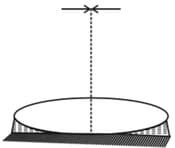There are two sources of light, each emitting with a power of . One emits of wavelength and the other visible light at . Find the ratio of number of photons of to the photons of visible light of the given wavelength?

Important Questions on Sample Paper I
A particle is moving three times as fast as an electron. The ratio of the de Broglie wavelength of the particle to that of the electron is . Calculate the particle’s mass and indentify the particle.
Consider two different hydrogen atoms. The electron in each atom is in an excited state. Is it possible for the electrons to have different energies but the same orbital angular momentum according to the Bohr model?
What do the terms ‘depletion region’ and ‘barrier potential' mean for a junction?
If the whole earth is to be connected by LOS communication using space waves (no restriction of antenna size or tower height), what is the minimum number of antennas required? Calculate the tower height of these antennas in terms of earth’s radius?
Derive an expression (in vector form) for electric field of a dipole at a point on the equitorial plane of the dipole. How does the field vary at large distances?
What is relaxation time? Derive an expression for resistivity of a wire in terms of number density of free electrons and relaxation time.
First a set of n equal resistors of each is connected in series to a battery of emf and internal resistance . A current is observed to flow. Then the resistors are connected in parallel to the same battery. It is observed that the current becomes times. What is ?
An equiconvex lens (of refractive index () is placed in contact with a liquid layer on top of a plane mirror as shown. A small needle with its tip on the principal axis is moved along the axis until its inverted image is found at the position of the needle. The distance of the needle from the lens is measured to be . The liquid is removed and the experiment is repeated. The new distance is measured to be . What is the refractive index of the liquid?

